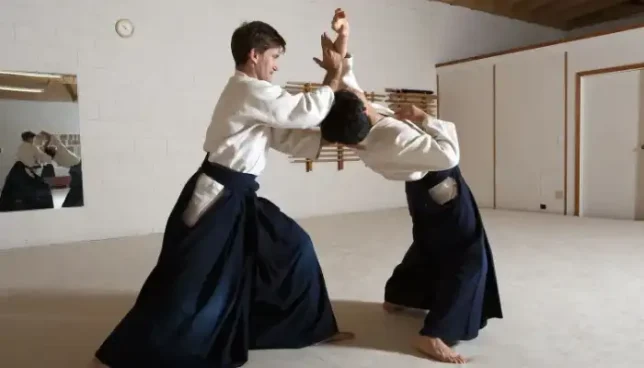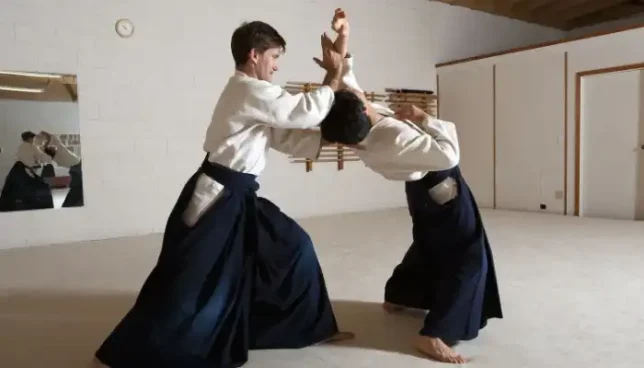The universe of combative techniques is a fascinating place. It is filled with customs and knowledge that can empower both the body and mind. From the smooth kicks in taekwondo to the grappling in Brazilian jiu-jitsu, there is something for everyone. However, when you are a beginner, it may seem like too much all at once. You don’t have to worry, though! This guide will give you everything you need to know before starting your martial arts journey.

A World of Discipline and Skill: What Martial Arts Are All About
Martial arts are systems of combat based on codified physical movements that combine mental discipline with them. They have been around for centuries and are found in various cultures across the world. Each style, with its own unique philosophy and diverse training methods, contributes to the vast tapestry known as “martial arts.”
Some popular styles are as follows:
- Karate focuses on developing self-control through strong strikes or explosive kicks.
- Taekwondo is known for its fast kicks delivered from jumping or spinning moves designed for both offense and defense purposes while teaching discipline and respect towards others.
- Jiu-Jitsu is a type of grappling art where one person tries to control another using leverage points rather than strength alone, making it ideal for those who are not as physically strong as their opponent.
- Muay Thai: Known as “the Art of Eight Limbs,” this style uses punches, elbows, knees, and shins to perform strikes which can cause significant damage, so it requires very high-level fitness from practitioners.
Unlike other sports, martial arts training covers more than just self-defense skills. Here’s what else they offer:
- Physical Fitness: Building power and strength improves cardiovascular health, and this process also enhances coordination and flexibility.
- Mental Toughness: These disciplines teach people how to be resilient under pressure by maintaining a clear focus on their tasks despite external distractions until they achieve the desired results.
- Self-Confidence: After mastering the different techniques involved in these arts, one begins feeling confident about themselves, thus greatly boosting their self-esteem levels.
- Stress Relief: During martial arts sessions, physical exertion, and deep breathing exercises can serve as powerful stress and anxiety-relieving methods.
Stepping onto the Dojo Floor: Starting Out
So now that you’re ready for your journey into the world of martial arts, let’s get down to some practical tips beginners can use:
- Find your style: Take into account personality type, level of fitness, or goals when choosing which one suits you best. Look up local schools online where various forms are taught nearby, so go ahead and try out introductory lessons there before settling on any particular form just yet.
- Find the Right Dojo: A good dojo will always have qualified instructors, clean, safe premises, and a friendly atmosphere. Check out those schools that cater specifically to beginners.
- Gear Up: As a beginner, what you’ll need in terms of gear may differ depending on what type of exercise routine is being followed, but generally speaking, loose-fitting clothing combined with comfortable athletic shoes would work well enough at first. Some places might also insist on specific training wearables or protective accessories, though!
- Etiquette for Dojos: Each discipline has its own set of ways of doing things, so be sure to show respect towards teachers and mentors as well as fellow trainees; bow when entering and leaving mat space; maintain focus throughout lessons, etc.
Building a Foundation: Training and Progressing
Consistency is key if anyone wants to become skilled in martial arts. Regular practice helps build muscle memory, making you better at performing moves over time while also improving overall physical conditioning. Here’s what to expect during martial arts training:
- Getting the Basics Right: To lay a solid foundation for your chosen style, you must first learn the basics of stances, strikes, blocks, and footwork.
- Setting SMART Goals: Set clear goals that are achievable. These could involve learning a specific technique, improving fitness levels, or taking part in a beginner’s competition.
- Track Your Progress: Keep a training journal to monitor development and celebrate milestones. Note down what techniques you learned, where you struggled, and how you felt during sessions.
- Challenges and Motivation: Setbacks and periods of frustration are natural. Embrace them as opportunities for growth and learning. Surround yourself with a supportive community at your dojo and concentrate on the intrinsic rewards of training.
- Mental Toughness: Martial arts training builds mental resilience. You’ll learn to push through discomfort, manage setbacks, and maintain composure under pressure. This mental fortitude translates into all areas of your life.
Reaching New Heights: Advancing Your Skills
As your skills progress, there are ways to deepen your knowledge within the chosen martial arts discipline:
- Belt Progression: To track students’ progress, most martial arts schools have a belt system. A new belt signifies mastery of specific techniques or skill acquisition.
- Advanced Training: Look into specialized programs that focus on different parts of your martial art, such as weapons or self-defense.
- Sparring and Competition: Often, sparring with other students allows for the safe testing of abilities while fostering a fighting spirit. Competing is optional, but it provides an excellent opportunity for personal challenges beyond one’s limits.
- Seek Guidance: Never stop learning from experienced practitioners; whether it be your instructor, senior student, or visiting master teacher, there is always more knowledge available. Here are some ways to seek guidance to take your martial arts journey further:
- Ask Questions: Don’t hesitate to ask instructors or seniors for clarification on techniques or concepts; good teachers love creating environments where people feel comfortable asking questions.
- Observe and Learn: Watch what skilled fighters do closely when they perform moves, etc.; also try watching high-level martial artist competitions or instructional videos.
- Seek Mentorship: Find someone who has been training longer than you have and ask them if they could mentor you. Having a mentor can be very helpful, especially when it comes to accelerating one’s learning process within this field.
Developing Mental Toughness
Martial arts are about mental strength as much as physical fitness.
- The Power of Discipline and Focus: Martial arts instill an unwavering discipline that stems from a more focused approach to life. Such training will also teach individuals how to channel their energy effectively in pressure situations, besides pushing through uncomfortable moments.
- Conquering Fear and Stress: Although stepping onto the mat can be nerve-wracking, with time, one learns how to effectively manage these emotions to prevent them from negatively affecting performance during matches or other related activities. Some useful techniques include deep breathing exercises, which help calm down nerves, thus enabling one to remain composed even in highly stressful events.
- Building Confidence Through Achievements: When people see themselves accomplishing things step by step, their self-esteem tends to increase significantly, so they feel more confident about what lies ahead of them. When someone masters new skills in martial arts, they acquire the courage to conquer fear, leading to mental strength.
Injury Prevention and Self-Care
Participating in martial arts requires proper technique, execution, and self-care measures to prevent injuries and maintain good health throughout the journey.
- Importance of Warm-up and Stretching: Spend significant time in a complete warm-up before each workout to prepare your muscles for work; after that, stretch to improve flexibility and decrease muscle soreness.
- Correct Technique is Everything: Proper teaching from a qualified instructor will minimize injuries by ensuring correct technique. Avoid attempting advanced moves beyond your skill level.
- Listen to Your Body: Look for signs of overtraining, such as fatigue, constant muscle aches, and reduced performance levels. Take rest days so that you can recover adequately, thus preventing injury during exercise sessions.
- When Should I Seek Professional Help? If you have an injury, go to see a doctor right away! A prompt diagnosis and appropriate treatment are necessary for a full recovery.
Becoming a Champion: The Mindset Outside the Dojo
True martial arts extend beyond those four walls. Here’s how one can develop a champion mentality:
- Embracing the Martial Arts Lifestyle: Martial arts should become part of your life; it should be more than just another hobby. Live by discipline, respect, and perseverance; incorporate them into your daily routines.
- The Mindset Of A Champion: Perseverance builds champions who remain humble even after winning countless battles against all odds while respecting everyone around them because they know people differ in capabilities as well as experiences gained through failure, which helps them appreciate challenges since with every challenge comes an opportunity for growth; hence, they should always strive towards betterment without settling, therefore treating their trainers nicely together with classmates, thereby fostering good relations among themselves and providing a conducive training atmosphere characterized by positivism.
- Setting New Goals And Continuous Improvement: The martial arts journey does not end until death takes us apart. Once you achieve one goal, set another even higher, such as learning complex moves or joining competitive leagues, and if possible, teach others as well. Knowledge is power and skill acquisition never ends, so keep honing your skills until they reach perfection, which may never come.
- Inspiring Others and Giving Back: Share what you’ve learned along the way with others who may need guidance on their journeys to self-discovery through martial arts practices. Take time out to mentor beginners or contribute something valuable towards fostering growth within your own community of practitioners.
Conclusion
There is no doubt that martial arts are a life-changing experience for anyone willing to take up this challenge. Armed with these few insights, I believe now that nothing should hold you back from starting your amazing journey into potential greatness through physical fitness and mental wellness attainment. Always remember, every great step begins with that first moment where everything seems impossible until we make it possible by pushing ourselves.

